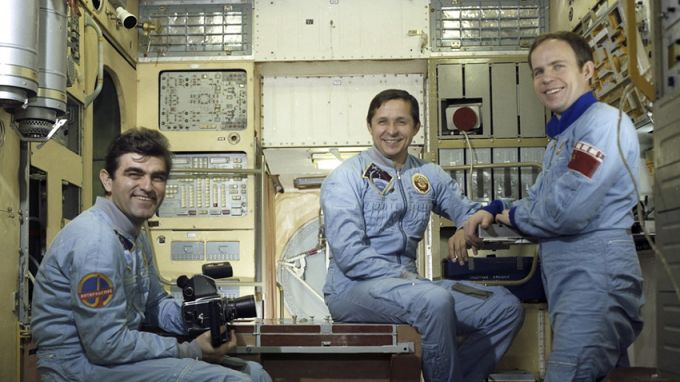
Do spacemen dream the way all people on Earth do? The positive answer to that seemingly simple question came neither easy nor quickly – that happened in 1988 and within the framework of the Shipka scientific program, carried out onboard the Mir space station by the second Bulgarian spaceman – Alexander Alexandrov during his 10-day-long mission.
The cosmonaut recalls: “Son-K was one of the most successful experiments. The dream of the spacemen was its subject, along with their ability to recover while sleeping out there. I was the one, chosen for the experiment and it was a successful one. It turned out that the same 3 stages of sleep existed in outer space – deep sleep, light sleep and the stage right before waking up. Thus we confirmed the ability of spacemen to fully restore their strength during a long flight in outer space…”
On June 7 at 6:03 pm Bulgaria had its star moment – the Soyuz TM-5 spaceship took off successfully to outer space with a crew of three – Bulgarian cosmonaut and researcher Alexander Alexandrov, the flight’s commander Anatolyi Solovyov and board engineer Viktor Savinikh. This time the mission of the Omurtag-born jet fighter pilot Alexandrov would be a complete success, unlike the dramatic first flight of Georgi Ivanov.

Here is what Alexandrov said minutes before the start:
“I am proud that Bulgaria participates, along with other socialist countries in the implementation of a huge program for the exploration of space for peaceful purposes. This is the second time that a Bulgarian takes part in a flight with the Soviet cosmonauts, symbolizing the eternal and unbreakable Bulgarian – Soviet friendship. I devote this flight to the 110th anniversary of Bulgaria’s Liberation from Ottoman rule and the 44th anniversary of the victory of the socialist revolution in our country.”
On 9 June 1988 the spaceship docked to the Mir space station, where Alexandrov managed to complete all the 56 experiments planned with 9 unique tools, created and developed by Bulgarian scientists and experts from the Shipka program.
“The flight was grounded on the Shipka space program which included the conducting of certain experiments in space physics and astrophysics, in space medicine and biology, as well as in different technologies. The tools were automated and allowed express analyses in real time, so some of the experiments could be repeated till reaching the desired parameters. That was how so many experiments could take place within 10 days only. That turned Bulgaria into one of the leading space nations – we were 6th in the world.”

On 17 June 1988 at 2:20 pm the reentry capsule with the three spacemen landed successfully in North Kazakhstan.
The distance of time reveals that the second space journey of a Bulgarian spaceman was not at all a free of charge gift born by Bulgarian-Soviet friendship, but was grounded on compensations. I.e. the tools and facilities created in this country remained at the disposal of the Soviet Union. One of them – the Lyulin dosimeter has been working ever since onboard the International Space Station.
The Bulgarian participation in the joint flight had its real price too – some BGN 7 million but many of the results of the Shipka space program found their implementation on Earth. For instance the Pleven 87 tool is still used to determine the speed of reactions of professional pilots, drivers and NPP operators.
The entire mission of Soyuz TM-5 was a full success and Bulgaria reached the peak of its space glory. The flight of Alexandar Alexandrov was the last impressive achievement in space before the start of the transition period in 1989.
English version: Zhivko Stanchev
Photos: archiveThe Other Bulgaria – these were the thousands of Bulgarians outcast abroad after the pro-Soviet coup d’etat on 9 September 1944. Scattered around the globe, they carried the image of their motherland, its controversial past, tragic present..
In a piece of correspondence, great Italian composer Giuseppe Verdi once wrote: „Do not try too hard to teach a singer how to sing. Provided he has got a devil on his back he knows how to sing.” These words perfectly suit Ghena..
„I had mostly poor marks in Bulgarian language and literature. I got them because I could not possibly write an introduction, a body copy and a conclusion in an essay. I begin as I like and wind up the story as I like.” This is what..

+359 2 9336 661
